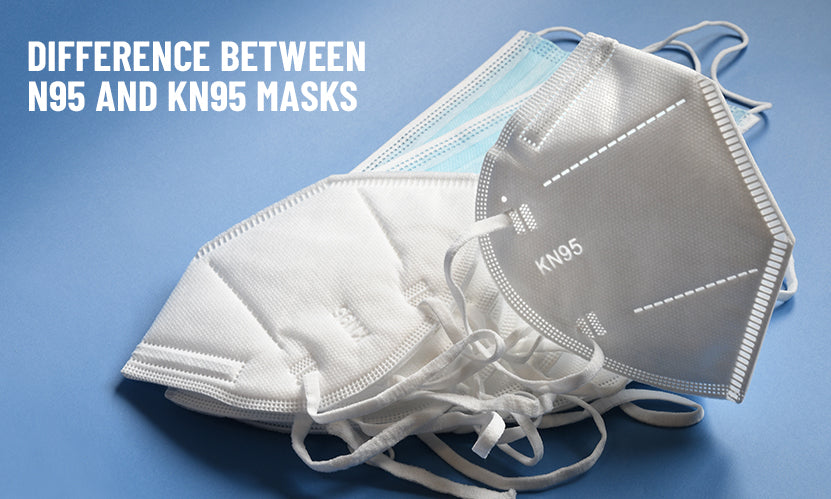N95 and KN95 masks have become essential tools in public health, particularly in response to the COVID-19 pandemic and other airborne diseases. Both masks are designed to filter out particles from the air, but they differ in terms of their standards, design, and usage. This article explores the differences between N95 and KN95 masks, helping you understand their key features and when to choose one over the other.
Understanding N95 Masks
N95 masks are a type of respirator that meets the National Institute for Occupational Safety and Health (NIOSH) standards in the United States. These masks are designed to filter at least 95% of airborne particles, including viruses, bacteria, and dust. They are highly effective due to their tight seal around the nose and mouth, which helps prevent leakage of unfiltered air. N95 masks are commonly used in healthcare settings, construction, and industries where air quality is a concern. NIOSH certification ensures that the masks meet stringent filtration and breathability standards.
Understanding KN95 Masks
KN95 masks are the Chinese equivalent of N95 masks and follow the GB2626-2019 standard. Like N95 masks, KN95 masks also filter out 95% of airborne particles. However, the primary difference is in the regulatory approval and design. KN95 masks are widely used in China and other countries for medical purposes and general public use. While both types of masks provide similar filtration efficiency, their testing procedures and certification processes vary.
Key Differences Between N95 and KN95 Masks
One of the main differences between N95 and KN95 masks lies in their certification standards. N95 masks are certified by NIOSH in the U.S., while KN95 masks are certified under China’s GB2626-2019 standard. Both require 95% filtration efficiency, but testing methods differ slightly.
1. Design and fit
Design and fit are also distinguishing factors. N95 masks typically use headbands to provide a tight fit around the head, which is ideal for healthcare workers who need prolonged use. KN95 masks, on the other hand, often use ear loops, making them easier to put on but sometimes providing a looser fit.
Additionally, the filtration efficiency of both masks is similar, but the testing procedures for breathing resistance and inward leakage vary between the two. NIOSH requires N95 masks to undergo rigorous testing for both filtration and breathability, while KN95 masks follow Chinese protocols. Breathing resistance in N95 masks is tested to ensure comfort for extended wear, which is crucial for medical professionals.
2. Availability and price
Availability and price are also significant factors. During the COVID-19 pandemic, KN95 masks were often more widely available and less expensive than N95 masks due to supply chain differences. However, it's important to note that not all KN95 masks meet the same quality standards, so identifying genuine products is crucial.
Effectiveness in Protecting Against COVID-19 and Other Viruses
Both N95 and KN95 masks are highly effective at protecting against COVID-19 and other airborne pathogens by filtering out viruses, bacteria, and particulate matter. However, due to their more secure fit and rigorous testing standards, N95 masks are typically preferred for healthcare workers. KN95 masks, with their ear loop design, are easier for the general public to wear in everyday situations, providing a balance of comfort and protection.
Proper fit and usage are critical for both types of masks to ensure effectiveness. A well-fitted mask reduces leakage and improves filtration, especially in high-risk environments.
Choosing the Right Mask: N95 vs. KN95
When choosing between N95 and KN95 masks, several factors should be considered, including availability, fit, comfort, and purpose. If you're in a healthcare setting or a high-risk environment, N95 masks with headbands offer better protection due to their tight seal. For general public use, KN95 masks provide a more comfortable fit and are easier to wear for short periods.
To ensure you're getting a genuine product, always look for certified N95 or KN95 masks. NIOSH-approved N95 masks have specific markings, and legitimate KN95 masks should meet the GB2626-2019 standard.
Incorporating Hari Hats for Additional Air Filtration
For individuals looking for an extra layer of air filtration protection in everyday settings, Hari Hats offers a unique solution. As a wearable air purifier, Hari Hats incorporates advanced filtration technology that filters out harmful airborne particles. This is particularly useful for outdoor environments where mask-wearing alone may not fully protect against pollutants or allergens. When combined with masks like N95 or KN95, Hari Hats provide an additional safeguard against poor air quality and airborne pathogens.
For more information on Hari Hats and how they can complement your air quality protection measures, visit harihats.com.
Conclusion
Both N95 and KN95 masks are effective at filtering airborne particles and protecting against viruses like COVID-19. While N95 masks are preferred in medical settings due to their tight fit and rigorous testing standards, KN95 masks are a suitable alternative for general use, offering ease of wear and good filtration efficiency. To ensure maximum protection, always verify the authenticity of the masks you purchase, and consider pairing them with additional filtration solutions like Hari Hats for comprehensive protection.
Also Read: How Long Do Face Masks Last?
